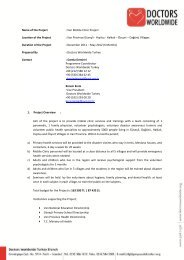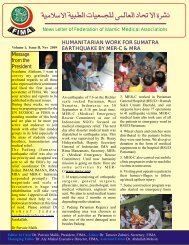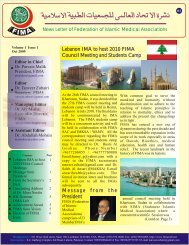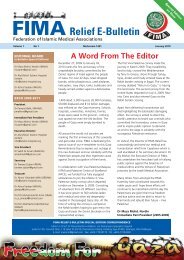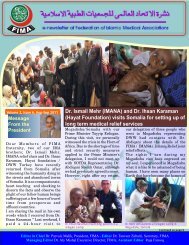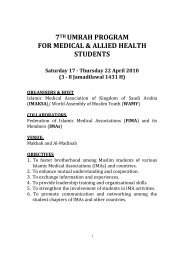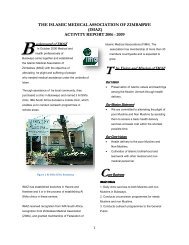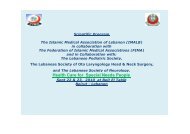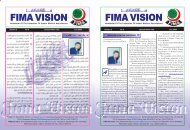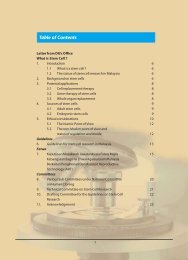FIMA Year Book 2009 - Federation of Islamic Medical Associations
FIMA Year Book 2009 - Federation of Islamic Medical Associations
FIMA Year Book 2009 - Federation of Islamic Medical Associations
Create successful ePaper yourself
Turn your PDF publications into a flip-book with our unique Google optimized e-Paper software.
Muslim Contributionsphilosophy. Khalifah al-Ma’mun(813-833 CE) and al-Mutawakkil(847-861 C.E.) were supportive toscience, research and development.Al-Mutawakkil reopened the Daral-Hikmah and further encouragedtranslation <strong>of</strong> books into Arabic.As a result, during the Umayyadand Abbasid periods, their capitalsDamascus and Baghdad attractedscholars and scientists from the thendeveloped world. When the centers <strong>of</strong>power moved to Cairo, Spain, Persiaand Istanbul, the flow <strong>of</strong> scholarsfollowed suit.Unfortunately with the political decline<strong>of</strong> the <strong>Islamic</strong> state, due to factorswithin and without, the lack <strong>of</strong> relevantpolitical patronage resulted in a paralleldecline in developments in knowledgeand with it science and technology.Indeed ibn Khaldun, in his book al-Muqaddima (23) described the factorsessential for the development <strong>of</strong> scienceand the decline which will ensue ifthese factors are lacking. Accordingto him knowledge is perfected andbecomes ubiquitous when the demandfor it increases because people try tolearn new knowledge but if there is nodemand for new knowledge then itbecomes neglected and will eventuallydisappear (24) .States, especially if politically stable, arethe greatest marketplaces for knowledgebase because <strong>of</strong> the huge demandsthey (the states) create. Consequently,if states were to decline, knowledgeand knowledge based pr<strong>of</strong>essions willdecline too. Ibn Khaldun also describedthat if a region becomes weak, loses itsinfluence and its population decreases,the pr<strong>of</strong>essions also decrease anddisappear(25). As for sciences, hedescribed that sciences increase withthe increase in prosperity and thegreatness <strong>of</strong> civilization in a region (26) .Baghdad, Cordoba, al-Qayrawan, al-Basra, and al-Kufa were cities whichwere populous and prosperous in theearly centuries <strong>of</strong> Islam. This led tocivilization and sciences to establishthemselves in these areas. But whenthese cities became less prosperousand their population also decreased,science and learning disappeared fromthese cities and moved to other regions<strong>of</strong> Islam. The lack <strong>of</strong> political stabilitycreated a situation where furtherprogress became almost impossible. Forany further breakthroughs in science, arevolution was necessary to overthrowthe old dominant systems. This type<strong>of</strong> revolution needs a well establishedcommunity <strong>of</strong> scientists working in astable and flourishing economy andsupportive atmosphere for a long time.This community was present in Europeafter the 15 th century and continued todevelop with the increase <strong>of</strong> Europeanwealth and population. <strong>Islamic</strong> worldwas lacking this type <strong>of</strong> communityand hence there was no developmentin scientific knowledge. Some authorssuggested the negative attitude <strong>of</strong>Muslim theologians as an importantreason for the decline <strong>of</strong> science in<strong>Islamic</strong> regions especially in 19 thcentury (27, 28) .<strong>FIMA</strong> <strong>Year</strong><strong>Book</strong> <strong>2009</strong>109




